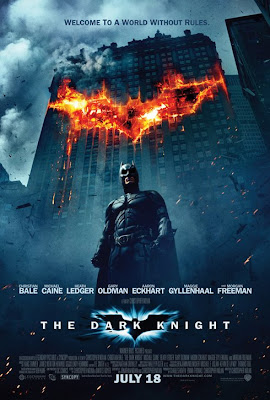 Dark Victory
Dark VictoryI'll be the first to admit that of all the superhero franchises out there, whether they come from the world of DC Comics or Marvel, none has fascinated me so much as Batman. I have always been attracted to the very dark style that has led to the development of deep psychological, disturbed and dangerous issues that were never present in Peter Parker's hectic teenage world or Superman's perfect alliance of superhuman powers. I also love Tim Burton and his first two installments remained for the longest time the best films the series had endured. Then, when Christopher Nolan was brought in to resurrect the series almost a decade after Batman & Robin, I loved his take on trying to make Batman grounded in a real world, as if a "Batman" could actually exist. I applauded that, but was still a bit hesitant to give it high praise, considering my allegiance to Burton and the previous films. With The Dark Knight, however, I have no problem in saying that this is much more than just the best Batman movie, or even the best superhero movie; this is the best genre picture that I have seen in a very long time.
Picking off exactly where Batman Begins left off, the Caped Crusader is still fighting the menacing threats of Gotham City. Christian Bale strikes an even greater balance of duality playing Bruce Wayne and his alter ego, who both face problems that are intriguing. Wayne is having trouble with his personal life still, as Rachel (Maggie Gyllenhaal, a clear improvement) becomes a rising star prosecutor alongside the new DA Harvey Dent (Aaron Eckhart). Dent is seen as Gotham's "White Knight" a figure whose face is friendly to the public and can help clean up the streets. Dent is also trying to nab certain mob guys, and enlists Batman to help track down one of them to Hong Kong (it's nice to see a Batman film get out of Gotham for a change). But Batman has more to worry about than some gangsters. His most famous arch -nemesis throughout the comic books, The Joker, is plaguing Gotham with attacks that offer to question the establishment with no real cause other than creating chaos. There's a lot on Batman's plate.
There are so many elements that make this film stand above many other pictures that came before it. One magnificent highlight is the acting. Bale is fantastic in a role that separates the problems of Wayne and Batman and then making the separate problems blur into each other. I had a slight problem with his "Batman voice" intruding on nearly every scene, but it's only a slight complaint. Gyllenhaal is always great in anything she does, and she brings so much more weight to the character than Katie Holmes did. Holmes wasn't bad in the first installment, but Gyllenhaal makes Rachel a character believe in, not to just fill up time until Batman rescues her. Other supporting players, including Eckhart (who does become Two-Face in this film), Michael Caine, Morgan Freeman, and even Eric Roberts in the gangster role that takes over for Tom Wilkinson, are all excellent pieces in the ensemble world of this film.
But of course, the true star is the late Heath Ledger. Like so many others, I believed that his performance was going to be good, but half of that would lend to the fact that his untimely death would result in higher praises than necessary. Nothing could be further from the truth. Ledger pours so much passion into this character that the thought of him not being here to enjoy this success never once crossed my mind (maybe once when the Joker is brought out in a body bag - that's not really a spoiler). Far from Jack Nicholson's interpretation, Ledger's Joker is a true psychopath; an insane menace who taunts our heroes for making points, not necessarily for personal, monetary gain. Ledger is the true star, and we can't wait to see him again on screen.
Another thing that makes this film excellent is Christopher Nolan. Now given proof of his genius of filmmaking, Nolan crafts this story like it's the real deal. He invests so much into the atmosphere in the story that sometimes the epic scale makes us seem like we're watching The Untouchables or Heat. He also does good of not only losing a Joker backstory, but allowing him to tell three different version, keeping the character clouded in mystery and focusing on what is happening now. The script, written by Nolan and his brother Jonathan (working off a story from David S. Goyer), reaches to new heights in the genre, and while containing many heavy plot elements, it only shows the sophistication of franchise now. Cinematographer Wally Pfister does fantastic work in lighting every bit of scenery, and I will always thank Nolan for choosing Chicago as his Gotham City (fellow Chicagoans, be on the lookout for an exciting chase scene through Lower Wacker and Randolph Station).
The talk is now starting to form if The Dark Knight will be up for a Best Screenplay, Director or even Picture nomination. I'd say of the three, screenplay is the closest it will come to. However, I completely believe in Leger's Oscar campaign for Best Supporting Actor. This is a performance that should be awarded not because of his passing, but because of simple great acting. Ledger's Joker is simply fantastic, and he has a great ensemble and the film's wondrous technical elements to aid him. It's unclear where a third Batman entry will go (I think Warner Bros. should chain Nolan to a desk and keep him forever), but as of now, we're looking at true victory, even if it is clouded in some darkness. **** / ****; GRADE: A






